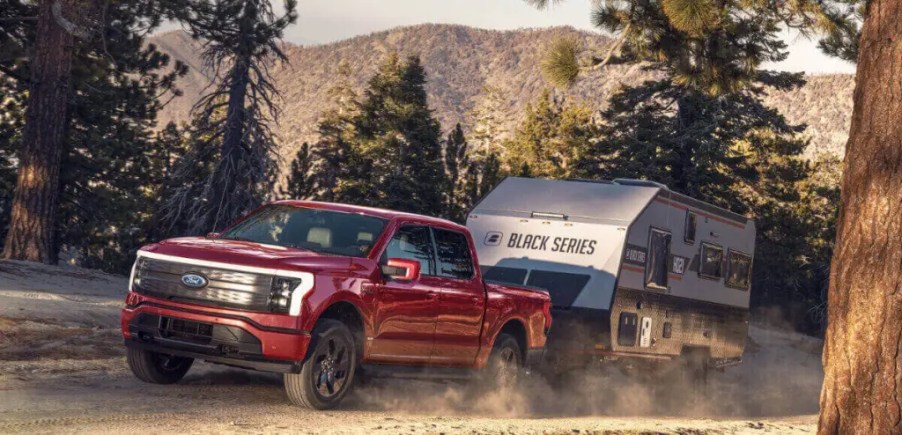
Towing With an Electric Truck May Not Be Worth the Trouble
Ford and Rivian have been making some pretty serious claims about the towing prowess of their electric pickup trucks. The immediate torque of electric powertrains certainly makes electric trucks appealing for towing, but it doesn’t come without a catch. Between decreased range, charging times, and charger locations, towing with an electric truck isn’t a very sure thing. With this in mind, are traditional trucks easier to use for towing? Are all the hassles in towing with an electric truck worth the trouble?

Which electric pickup truck is better for towing: Ford F-150 Lightning or Rivian R1T?
While other new electric pickup trucks are on the horizon, we can’t count those chicks before they hatch, so we’ll focus on the existing electric trucks.
Consumer Reports compared the Ford F-150 Lightning and the Rivian R1T to see which is the better towing vehicle. That said, the Ford F-150 Lightning ($80,889 as tested) with the extended range battery has a full range of 320 miles. This unit makes a massive 580 hp 775 lb-ft of torque.
The Rivian R1T ($74,500 as tested) has a quad-motor setup making an insane 835 hp and 908 lb-ft, all capable of running for 314 miles, according to the EPA.
How much did the trucks tow?
Both electric pickup trucks pulled an enclosed trailer loaded with 10,000 lbs. This is bumping up against the F-150 Lightning’s towing limits while it’s about 1,000 lbs shy of the Rivian’s. As noted by Consumer Reports, for reference, the gas-powered F-150 can tow up to 14,000 lbs when properly equipped.
The same driver performed the towing test on the same day in the same weather conditions. The test had each electric pickup truck towed at 65 mph with the climate set to 70 degrees. The test loop was 74 miles.
At the end of the complicated test, the Lighting had a range of 91 miles with a 10,000-lb load. The Rivian got only 85 miles of range.
Electric trucks are still more trouble than they’re worth
CR notes that both trucks drove nearly equally well, and they both pulled nearly the same, yet they also both had the same hassles. Charging is still a very critical consideration EV owners have to contend with. This is doubly true when towing due to the limited range.
Towing is typically done in conjunction with a longer journey, either for camping or moving. When you only get 85-90 miles of range, you must plan a specific route based on charging stations. Not only that, but you must also plan to spend a decent amount of time at the charging locations.
There is another issue with EV charging while towing. Most EV charging stations aren’t set up like pull-through fueling stations. Chargers are often in small lots, up against curbs, or even only in street parking spots. This can pose a real problem if you are pulling a 20 ft trailer. It is a reasonable expectation that you’ll have to uncouple from your trailer, leave it somewhere, and then go find a charger. Imagine doing this many times throughout a 500-mile drive.
These are even more charging problems with towing
Many EV drivers have found that the fastest way to charge and get on your way is to keep your battery level between 20-80%. According to Consumer Reports, charging from a nearly flat battery can take considerably longer. While a clever trick for vehicles with hundreds of miles of range, this would require near-constant charging if you only get 90 miles of range.
If those weren’t enough issues, charging at a DC fast charger that often also raises the risk of damaging your battery, to boot.
While we’re at it, CR notes that Rivian doesn’t offer towing mirrors from the factory, so that is another little stab to consider on top of everything else. While the electric F-150 uses the same hitch as the normal F-150, the Rivian uses a slick hidden hitch. This looks clean and nice but requires crawling under the truck to expose it.
Is towing with an EV a good idea?

While the EV powertrains are particularly well-suited for comfortably pulling heavy loads, no other part of these trucks is really convenient for the job. Given the high price, limited functionality, and massive added time needed to tow with an EV, most drivers will likely have a better towing experience with a traditional gas or diesel truck. Not to mention, automakers have spent decades perfecting this with HD trucks; the EV market isn’t mature enough to do this job without major inconvenience.





